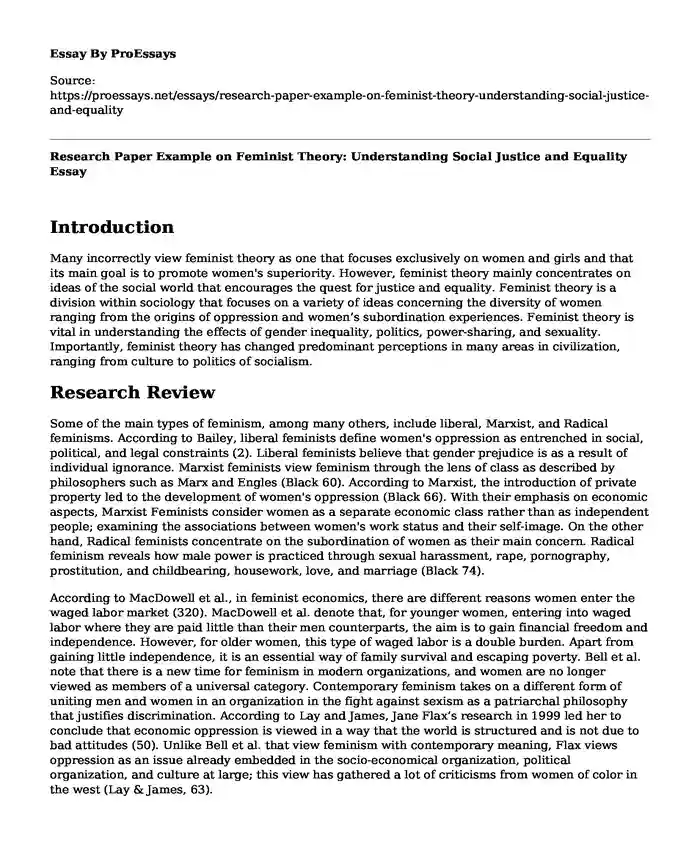Introduction
Many incorrectly view feminist theory as one that focuses exclusively on women and girls and that its main goal is to promote women's superiority. However, feminist theory mainly concentrates on ideas of the social world that encourages the quest for justice and equality. Feminist theory is a division within sociology that focuses on a variety of ideas concerning the diversity of women ranging from the origins of oppression and women’s subordination experiences. Feminist theory is vital in understanding the effects of gender inequality, politics, power-sharing, and sexuality. Importantly, feminist theory has changed predominant perceptions in many areas in civilization, ranging from culture to politics of socialism.
Research Review
Some of the main types of feminism, among many others, include liberal, Marxist, and Radical feminisms. According to Bailey, liberal feminists define women's oppression as entrenched in social, political, and legal constraints (2). Liberal feminists believe that gender prejudice is as a result of individual ignorance. Marxist feminists view feminism through the lens of class as described by philosophers such as Marx and Engles (Black 60). According to Marxist, the introduction of private property led to the development of women's oppression (Black 66). With their emphasis on economic aspects, Marxist Feminists consider women as a separate economic class rather than as independent people; examining the associations between women's work status and their self-image. On the other hand, Radical feminists concentrate on the subordination of women as their main concern. Radical feminism reveals how male power is practiced through sexual harassment, rape, pornography, prostitution, and childbearing, housework, love, and marriage (Black 74).
According to MacDowell et al., in feminist economics, there are different reasons women enter the waged labor market (320). MacDowell et al. denote that, for younger women, entering into waged labor where they are paid little than their men counterparts, the aim is to gain financial freedom and independence. However, for older women, this type of waged labor is a double burden. Apart from gaining little independence, it is an essential way of family survival and escaping poverty. Bell et al. note that there is a new time for feminism in modern organizations, and women are no longer viewed as members of a universal category. Contemporary feminism takes on a different form of uniting men and women in an organization in the fight against sexism as a patriarchal philosophy that justifies discrimination. According to Lay and James, Jane Flax’s research in 1999 led her to conclude that economic oppression is viewed in a way that the world is structured and is not due to bad attitudes (50). Unlike Bell et al. that view feminism with contemporary meaning, Flax views oppression as an issue already embedded in the socio-economical organization, political organization, and culture at large; this view has gathered a lot of criticisms from women of color in the west (Lay & James, 63).
Conclusion
In conclusion, feminist theory has given rise to different perceptions in many areas in civilization, ranging from culture to politics of socialism. Liberal, Marxist, and Radical feminism are some of the main types of feminist theories. According to these feminist beliefs, women's rights should be promoted for purposes of achieving equality with men. Although there are different viewpoints on contemporary and traditional feminism, feminists share the same perception of gender inequality, politics, and power-sharing.
Work Cited
Bailey, Lucy E. "Feminism, Liberal." The Wiley Blackwell Encyclopedia of Gender and Sexuality Studies (2016): 1-3, https://doi.org/10.1002/9781118663219.wbegss738
Bell, Emma, et al. "Time’s up! Feminist theory and activism meets organization studies." human relations 72.1 (2019): 4-22,
https://doi.org/10.1177/0018726718790067
Black, Naomi. Social feminism. Cornell University Press, 2019.
Lay, Kathy, and James G. Daley. "A critique of feminist theory." Advances in social work 8.1 (2007): 49-61, doi:10.18060/131
McDowell, Linda, and Joanne Sharp, eds. Space, gender, knowledge: Feminist readings. Routledge, 2016.
Cite this page
Research Paper Example on Feminist Theory: Understanding Social Justice and Equality. (2023, Oct 15). Retrieved from https://proessays.net/essays/research-paper-example-on-feminist-theory-understanding-social-justice-and-equality
If you are the original author of this essay and no longer wish to have it published on the ProEssays website, please click below to request its removal:
- Essay Example on DPS and U.S. Border Patrol
- Women at the World's Colombia Exposition
- Research Paper on Drug Addiction Among the Youth in Kuwait
- Nursing: From Female-Dominated to Gender-Neutral Profession - Essay Sample
- Essay Sample on Reforming Juvenile Justice in America: A 200-Year History
- Essay Example on Immigration: A Positive Force for the US Economy
- Free Report Example on Men's Fertility & Fatherhood







